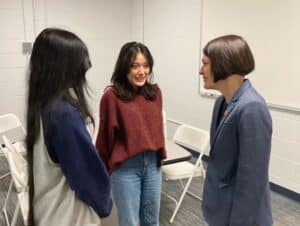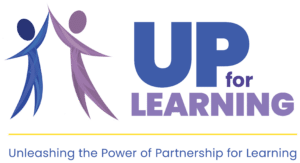On the morning of Wednesday, January 18th, newly sworn-in US Representative Becca Balint visited Winooski to meet with students and take a tour of the city’s renovated school. UP for Learning Youth Facilitators, and members of Winooski’s Antiracism Steering Committee Auishma Pradhan and Mea Ree Jan, took part in an extended conversation with Balint, sharing their experiences, and learning about Balint’s road to becoming the first woman and openly LGBTQ person to represent Vermont in Congress. Their discussion was recorded by Ned Castle, a Burlington-based filmmaker who is documenting stories with UP for Learning as part of a joint learning agreement with the Kettering Foundation on how working in youth-adult partnership reflects true participatory democracy.
Balint had many questions about the steering committee and action teams, and Mea Ree and Auishma explained their origin, a set of eight demands put forth in 2020 by the Winooski Students for Antiracism. Six of the eight demands were adopted by the Winooski school board: to form a Racial Truth and Reconciliation Committee, to develop an action plan to hire and retain faculty of color, to implement an ethnic studies program, to form a review committee to evaluate curriculum and policies, to host civil rights workshops for families, and to launch a mentor program for multilingual students. Soon after the demands were adopted, the district reached out to UP for Learning to help steward the work.
Auishma shared with Representative Balint how the make-up of the committee and action teams has changed a great deal since they began in 2020.“It was like 80% adults and 20% students. And although it was fine because we learned from them and they have more experience …what we really struggled with was being able to speak out because there are so many adults and there were just a lot of talking going on. So it was nice hearing some youth voices, and I’m so happy because the dynamic really changed over the three years. I am proud of our progress, that we were able to recruit youth and they had a lot to say about… how we could heal our community and [create] transformation.”

During their conversation, Representative Balint commented on the process of creating an Ethnic Studies curriculum, reflecting on her past experience as a middle school history teacher. “One of the tensions here in Vermont,” she remarked, “is that you want people at the local level to be making decisions about the curriculum. We call it local control. There are good things about local control. There are also things that fall through the cracks, things that universally should be taught. And I think that is where we can do a better job, is we don’t want to be too prescriptive, like telling each school and district what to teach, but it needs to make sense for the kids within that community so that they understand cycles of oppression, so that they understand the way racism has has shown up and continues to show up.”
Mea Ree and Auishma asked Representative Balint how she first became involved in politics, and learned that she considered herself “punk rock,” in high school, and sported a blue mohawk. She also shared with them that her Hungarian-Jewish grandfather was killed in the Holocaust, and that his loss had a profound impact on her. Balint remarked, “I was active in community organizations and very active on reproductive rights at that time. And the through line for me has always been about… thinking about my family’s experience and the Holocaust and how hate grows. Hate grows because we get fearful and people fan the flames of fear and scarcity. And so I’ve always thought, regardless of how much actual political power that we have, we can have an impact in our individual conversations that we have within our communities. And so I tried to do that in my punk rock way.”
Balint also spoke to her excitement about joining the 118th Congress, saying, “We have more women, we have more people of color, we have more queer people. And so that feels amazing, like we’re getting closer to representing America as a whole. And a lot of people look at what’s happening in DC and they say everything is broken and everyone’s screaming at each other and there’s so much dysfunction and division and there surely is that. That is true. That is part of it. But I think what other people do see outside of it when the cameras are turned off is that there are really good people who’ve run for office who care deeply about their communities back home. Just like you are motivated to do this because you care about your communities.” Balint then asked Mea Ree and Auishma what careers they might be interested in pursuing, and Mea Ree said, “I hope to go into a medical field so I can help people. But I also want to bring restorative justice into that work, because there’s a lot of injustice.” Auishma responded, “I have a lot of pathways that I’m interested in, but I’ve recently been interested in pursuing what we’re doing right now as a career path, because I do like working with community members and youth, and I think it’s really fun hearing everyone’s voices and interactions and I hope to help them. And Winooski is very dear to me … I live in South Burlington and I still come here and do the work with everyone. And because I lived here for so many years, I can’t just leave my community. So I do hope to help people in general.”
At the close of their conversation, Balint shared, “I wish that somebody, when I was your age, had said to me, you really can run for office. And in Vermont, it’s much more possible because we’re always saying Vermont’s people-sized. If you can, run for a local office and city council and legislature. And if there’s an experience that you want to have, that’s also something that my office does—make sure people who are interested can get internships either with us or at the state legislature. I want you to know it is possible for you to do this work. And we need dedicated people like you in office.”

